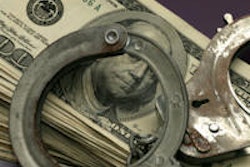
ANAHEIM, Calif. - Embezzlement does not have to start big. It can start with something as small as a toothbrush or a pen, but could cost you hundreds of thousands of dollars in the end, according to Susan Gunn, an advanced certified QuickBooks ProAdvisor and author of 12 technical books, who was speaking at the California Dental Association (CDA) Spring Scientific Session on Friday.
Employees may have a number of reasons to pilfer. They might feel like the practice owes them or that the practice can spare the few extra thousand dollars. They could rationalize that they are only borrowing it for a good purpose, such as paying family medical bills.
In a three-hour session, Gunn explained how you can protect your business from embezzling staff.
Make sure you have organized accountability between your practice management software and QuickBooks, she said. As the last patient walks out the door, have your office manager print out the day sheet. Compare the day sheet to the summary printed from the credit card machine. They should match. If they don't, find out why. Always look at the day sheet so the staff knows you are paying attention.
List all checks on the deposit slip, and make sure you have only one deposit slip per day. The practice owner should be the only one taking the physical deposit to the bank. "Deposit only" should be stamped on the back of every check, and make sure there are no signature stamps at your practice.
If you have a petty cash fund, create a petty cash worksheet specifying how much amount is being taken out and why. Then initial it. This tells your staff there is accountability in the office.
Loaning employees money should be an exception, not a rule. "Some people are in a crisis every week and they are not the right candidates for loans," Gunn said. Never loan employees an amount that exceeds their monthly pay check.
If you do loan money, have employees sign a form that says a certain dollar amount will be deducted from their pay check every month. That way if they leave before the loan is paid in full, you can deduct the remaining amount from their final pay check.
"If you loan employees money and don't have them sign something, you might as well wave that money goodbye," Gunn said.
At the end of the day, examine the physical patient sign-in sheet as well as the appointment schedule. Also examine the audit trail report that shows appointment changes. Spend some money and have your practice management software specialist come out and spend half a day with only you -- not the front desk manager, Gunn emphasized.
As for payment from insurance companies, make sure you disperse the duties. Three different people should handle the process. One should get the mail and make copies, another should enter the insurance checks into the practice management system, and a third should complete the deposit slip. An even better option would be to switch to electronic deposits for insurance checks.
Gunn recommends investing in fingerprint time clock technology to track employee's hours. This type of system eliminates calculation errors, decreases the risk of fraud, and prevents buddy punching of time cards.
And keep track of inventory, she said. Review inventory orders, received orders, and sold items in the practice management software.
Before hiring new staff, conduct background checks on potential employees. Have the applicant sign a release for background and reference checks, and check those references without fail -- doctor to doctor, Gunn said.
Make sure you have a personnel office manual that includes job descriptions, standard operating procedures, time card policies, time off policies, and guidelines for staff repayment of service. This sends a message to staff that your practice is a professional business and there is accountability.
Be sure to set the precedent in your office, Gunn said. You are the boss, and your business decisions should not be based on personal perspectives. Make good decisions for the business. If you are doing something illegal, no matter how trivial, you are sending out a message that tells your staff that anything goes.
Be wary of employees who stir up dissention in your practice. Also look out for those who don't take any time off -- send them away on a vacation and audit the books. Don't sign incomplete checks or let employees get access to blank checks. If you have been subjected to embezzlement, take legal advice only from your attorney. Never take advice from your CPA in these matters.
Gunn's final and most emphasized advice: "Be the boss and take charge of your business!"



















